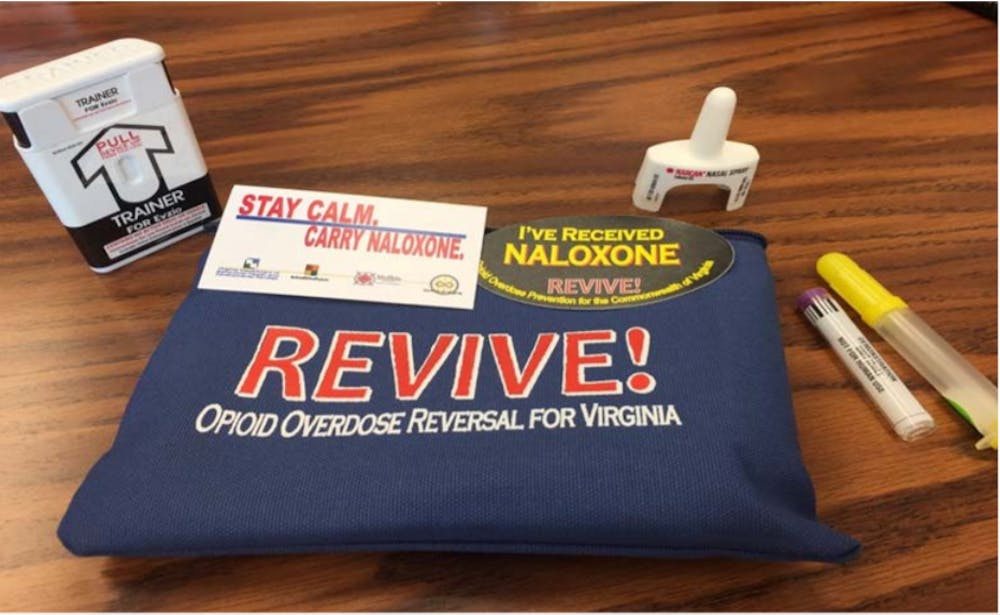The University of Richmond Police Department (URPD) began receiving training last Wednesday to administer Narcan, a naloxone nasal spray that temporarily counteracts the life-threatening effects of opioid overdoses.
Assistant Chief of Police Beth Simonds was impressed by how fast-acting Narcan was after seeing a demonstration in August.
“It was pretty amazing," Simonds said. "Essentially, you had a person who was completely unresponsive, not breathing and blue, to sitting up, conscious and speaking."
Although the spray is a non-intrusive and easy-to-use response to the immediate effects of an overdose, it is not a substitute for emergency medical care. It only temporarily suppresses the effects, mainly respiratory arrest, for about 30 to 45 minutes, long enough to get victims further medical assistance.
Simonds and Officer Kelly Hoover instructed the rest of URPD’s officers, who had yet to receive Narcan training. The two officers had attended a session of Virginia’s REVIVE! program in August, an ongoing statewide opioid overdose and naloxone education program.
REVIVE! is a state-supported program by the Virginia Department of Behavioral Health and Developmental Services (DBHDS) and the Virginia Department of Health, along with several recovery organizations. Since 2013, it has provided training sessions in Virginia on how to identify people experiencing opioid overdose and how to properly administer Narcan to stabilize them.
Hoover said their session lasted about four hours, at the end of which she and Simonds were certified to possess and administer the nasal spray.
Once training sessions are completed, officers will be certified to use Narcan in addition to the first-aid and CPR or EMT training they already have.
The Henrico Department of Health will be providing Narcan to the URPD for free. The police department does not currently have the drug but hopes to be fully equipped by the end of September, Simonds said.
One reported incident of opioid overdose at UR occurred this past summer.
"We had one overdose this summer," Simonds said. "It actually didn't involve a student. It involved someone who was working here on campus. We're seeing more [opioid overdoses] in the surrounding community, so we're assuming there's potential that we could see it here."
Christopher Clark, RC’18, president of UREMS, agreed. Clark said that student opioid abuse was eventually bound to happen and that URPD’s new training could further benefit the campus’s response efforts.
Enjoy what you're reading?
Signup for our newsletter
“Honestly, in my belief, it’s not a question of if it’ll happen on our campus. It’s when it’ll happen," Clark said. "It’s a growing problem and eventually, unfortunately, it will probably make its way out here. That’s why it’s important for URPD to know how to handle it."
As a subsidiary of Richmond Ambulance, UR EMTs are not permitted to administer drugs to victims — only Richmond paramedics are.
Although opioid abuse and overdoses have not been observed among students, according to Simonds and Clark, the growing opioid epidemic in Virginia, and the United
“Virginia is currently under a public health emergency as a result of the opioid addiction crisis. Virginia has been severely impacted by opioid abuse, particularly the abuse of prescription drugs,” reads a statement on the REVIVE!

According to the Washington
The main perpetrators of opioid deaths in Virginia are heroin, synthetic opioids and fentanyl, state health officials said.
Fentanyl, a Schedule II drug, was reportedly responsible for 618 deaths in Virginia last year, more than either heroin or prescription painkillers. Its death toll continues to climb yearly, with more incidences now occurring because of illegally produced fentanyl than prescription fentanyl.
A mere three milligram-dose of fentanyl can kill an average adult male, while it takes 30 milligrams of heroin to do the same.
First responders, including URPD, are asked to wear gloves and face masks when the substance is suspected to be present because it can be effective even through contact or inhalation.
Justina Choo, WC'20, said she hoped that UR would act proactively to spread awareness about the growing opioid problem.
“If there is potential for opioid abuse, I’d hope that the University starts raising awareness about the severity of its dangers for students,” Choo said in an email.
Simonds stressed that although URPD is a law enforcement body, students should not let that stop them from calling for help if need be.
“All of our top priorities should be to get people the medical care that they need," Simonds said. "It is our responsibility to enforce the law, but we hope that people would not be so concerned about the possibility that they might get into trouble for drug use that they risk somebody being permanently injured or dying."
A standing order in Virginia currently allows all Virginians to purchase naloxone directly at pharmacies.
REVIVE! also hosts public training sessions for anyone that is interested. Planned events can be found here.
Contact news writer Arrman Kyaw at arrman.kyaw@richmond.edu.
Support independent student media
You can make a tax-deductible donation by clicking the button below, which takes you to our secure PayPal account. The page is set up to receive contributions in whatever amount you designate. We look forward to using the money we raise to further our mission of providing honest and accurate information to students, faculty, staff, alumni and others in the general public.
Donate Now



